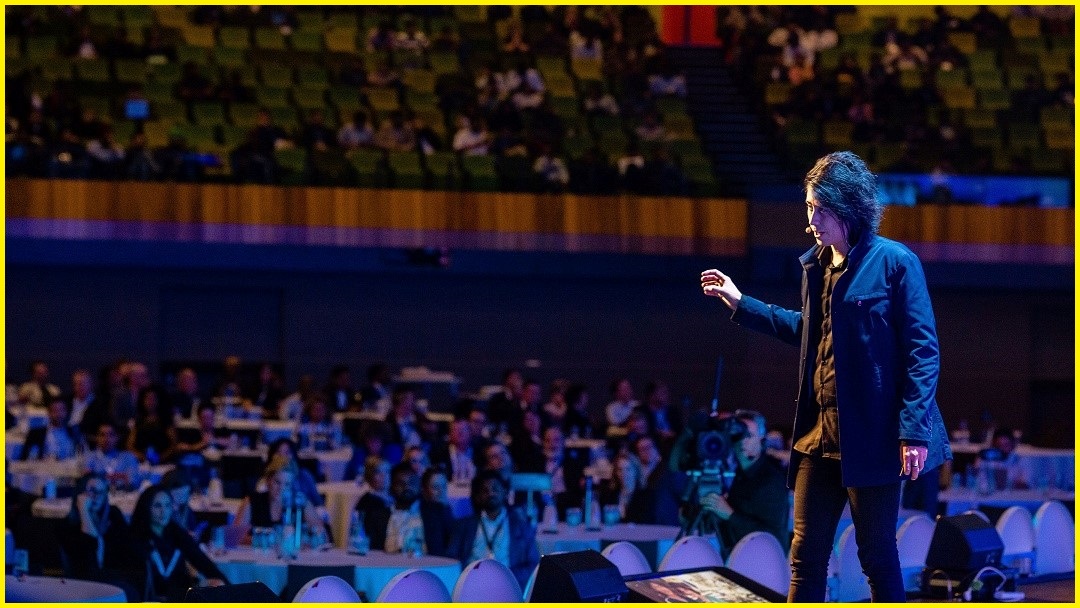It’s easy to be pessimistic about the future of the world.
Mass surveillance technology, killer robots, data that rigs elections, tech giants running amok – at times it looks pretty bleak.
But Dr Jordan Nguyen’s infectious attitude makes it hard not to be optimistic about how tech can make our world a better, more inclusive, place.
Dr Nguyen – 2017 ICT Professional of the Year – delivered an energetic speech to mark the end of the ACS Reimagination Thought Leader’s Summit on Wednesday, showcasing the benefits tech has on lives around the world.
“Who feels we are optimistic about where we’re going with the future of technology?” he asked the crowd of technologists.
A majority of hands went up around the packed room in the Melboune Convention Centre.
“Great, a lot of people,” Dr Nguyen said. “This is going to make my job a lot easier today.”
“Okay now, let’s be honest. Put your hand up if you’re somewhat cautious about where the future of technology is going. Who’s worried?”
Dr Nguyen then went to people who said they were concerned about where technology was heading and asked about why they were worried.
Issues like security, surveillance, keeping humans involved, and social impact came up.
“Every major technological advancement brings about new ethical issues to solve, new dark sides to explore – and more episodes of Black Mirror,” Dr Nguyen said
“But there are also many positive opportunities with technology as well, and that’s what we’ve got to find.”
For the next 45 minutes, Dr Nguyen used his personal experiences to bring back the benefits of tech.
He walked us through the story of how his friend Riley, a young man with cerebral palsy, learned to drive a car with his mind.
By developing a form of brain machine interface – and with a lot of perseverance – Riley successfully drove a car through an obstacle course without ever touching the steering wheel.
“We wanted to look at how all of these technologies could come together as a toolkit to achieve the impossible,” Dr Nguyen said.
“At the same time it was all filled by human purpose – inspiration.”
Riley’s story become one of hope for other people living with disability, and it helped reimagine what could be achieved with human ingenuity.
“The thing that none of us could have expected was that it spread all around the world and it changed the face of disability for so many people,” Dr Nguyen said.
“We kept getting written to from people saying they now have a different understanding of what someone else can achieve.”
Dr Nguyen then took the audience on a journey examining cutting edge technologies from autonomous passenger drones, to surveillance cameras, all the while suggesting that there are still opportunities for positive change, even in a world of mass data collection.
“Regulations do have trouble keeping up, so now we have to raise these important conversations so we can steer this change and think about the things we want and the things we don’t want,” he said.
“Hands up if you would give away all of your data – the places you go, the things you eat, the exercise you have, your genomics data – if it ensured you 20 extra years of your life?”
Plenty of hands went up once again, but the crowd was less optimistic about giving away all their data.
Jordan then told the story of a company that would ingest health data and use machine learning to recognise patterns of health outcomes based on the information.
“While it was collecting all of the data of one of the founders, it gave him a 90 per cent chance that he was going to end up with diabetes,” Dr Nguyen said.
“So he started managing his diet and his exercise to combat the predisposition to diabetes that he was never actually diagnosed with based on the data.
“The idea of a digital twin is a little bit worrying for some people, but if it can ensure 20 extra years of quality of life then I can see where the line starts to shift.
“But this is why we need to explore this technology, so we can learn how it works and figure out what to achieve with it.”
Dr Nguyen saved his most emotional story for last.
He wanted to explore the beauty of interactive digital avatars that will help a version of you live on long after you’ve died.
Miguel and Maureen have been together for 50 years.
“I showed them virtual reality and then sat down with Miguel and interviewed him for six hours, took a 2D video wrapped around a 3D version of him on the computer, and worked with three guys over a week-and-a-half to make this interactive avatar,” Nguyen said.
The outcome was startling.
Maureen put on the headset and was able to speak with a virtual version of her husband.
“This was an emotional adventure to go on, but it was an amazing thing to realise the tools of today and what we can achieve with them,” Dr Nguyen said.
“We’re going to make a lot more of these avatars by working with families to capture the representation of person in space and time.
“But we still need to know where the ethical issues are, what the potential challenges will be, and where the traumatic areas will be.”
By not delving too far into the murky areas of future technology, Dr Nguyen keeps the possibilities open.
“It all comes down to mindset,” he said.
“If we keep up with and embrace these changes, we realise we can shift and shape and change them, then we embrace the changes and affect the lives of people around us.
“The important thing is that it’s humans first and technology second – it should never just be about the technology, but what we can achieve with it.”










